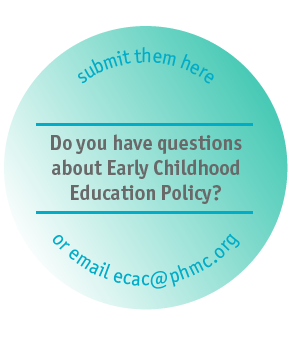Ask ECAC
Q: Can you suggest some funding strategies for our expanded pre-K? What are other cities doing?
A: Currently, there is strong political and public support for early childhood education—across the country and in cities. A 2013 article from EdCentral describes the context at that time: “There is a clear focus in each city on leveraging public and private resources to finance publicly funded pre-K. Denver and San Antonio utilize a voter-approved dedicated funding stream through a new tax, which not only protects the funding from the city or state budget process, but also makes clear that local residents support prioritizing early education spending. These local efforts are also taking place in states that already provide state-funded pre-K, as in Oklahoma. In these instances, the local funding streams are designed to make up for shortfalls in state funding rather than to build a new program from scratch.”
Q: Have other states used lottery systems to fund ECE programming? If so, how do their funding mechanisms work, and what kinds of impacts have these new systems had on existing systems?
A: Have other states used lottery systems to fund ECE programming? If so, how do their funding mechanisms work, and what kinds of impacts have these new systems had on existing systems?
Georgia established a new state lottery in 1993; profits from the lottery were dedicated to funding a number of educational programs, including state-subsidized Pre-K for low-income four-year-olds. In 1995, Georgia became the first state in the US to provide universal Pre-K to four-year-olds, relying substantially on lottery profits to fund the expansion. Georgia's experiences provide valuable insight into the challenges and advantages of employing lottery funding to support ECE; and into the pros and cons of universal, versus means-tested, Pre-K models. Below are some brief, informative takeaways taken from a Foundation for Child Development report:
Q: Why is Philadelphia proposing Universal Pre-K and not targeting programs (and spending) towards children who need it most?
A: When resources are limited and many children need pre-k services, it is tempting to consider providing services only for the children who are defined to be most at-risk of facing subsequent school and life challenges - often defined by targeting children from families earning below a particular income level. But there are good reasons to make preschool programs universal - available to all children of eligible age living in the city. Here are some:
Do you have a question about Early Childhood Education Policy? Submit it via email to ecac@phmc.org and we may answer it here in the future.
